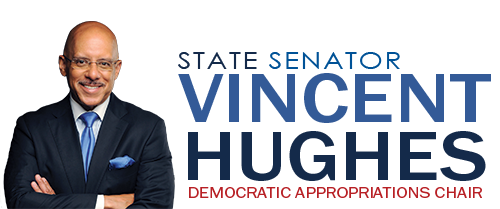Harrisburg – Oct, 20, 2015 – State Senate Democrats today called on the Pennsylvania state treasurer to “stop payment” on a scheduled disbursement of property tax revenue headed to charter schools. They have sent a letter to state Treasurer Tim Reese formally asking for the withholding of the money.
“Charter schools are seeking gaming tax relief funds based on one legal interpretation, while public schools and many public officials have a different view of the law,” state Sen. Democratic Leader Jay Costa (D-Allegheny) said today. “The treasurer should not release one dime until there is legal clarity and outstanding issues have been resolved.”
Charter schools contend that they are due disbursement from funds generated from gaming revenues. Typically, when a state budget is adopted, charter school funding is deducted from basic education subsidies.
Due to the budget impasse the normal funding stream is not available. The charters say that the law stipulates that since those funds are not available, the funds are then deducted from other state payments. The state is expected to make a $45 million payout to charter schools on Oct. 22, with 312 school districts diverting funds to charter schools.
“All of our schools, including traditional public schools and charters, need to be appropriately funded by the commonwealth,” Senate Democratic Appropriations Chair Vincent J. Hughes (D-Philadelphia/Montgomery) said. “However, we cannot provide special assistance to charter schools while many other school districts are suffering.
“I urge the state treasurer to hold off making payments to charter schools until the budget impasse has been resolved and all schools have funding in place.”
Sen. Jim Brewster (D-Allegheny/Westmoreland) called for the suspension of the payment to charter schools late last week. Brewster said “public schools are facing incredible difficulties because of the lack of a state budget.
“Now, the funding they are getting outside of the basic subsidy is being hijacked and that is wrong.”
Brewster pointed to the situation involving two of his school districts in the Monongahela Valley as examples of inequity. He said that while McKeesport is due $1.2 million in reimbursements, they will only receive $41,000 after charter school funds are deducted. He said that Clairton will have to send its entire $230,000 reimbursement to charters and receive nothing.
“Since so many of our schools are hurting due to the budget impasse, we need to answer important legal questions regarding these funds before they are distributed later,” Sen. Andy Dinniman (D-Chester), Democratic chair of the Senate Education Committee, said. “The bottom line is that both public and charter schools are in need of these supplemental gaming funds – funds that do not go through the normal budget process.”
In the letter to the treasurer, Senate Democrats said they do not believe that gaming fund reimbursements constitute “state payments” and that the state law dealing with disbursement of funds never contemplated a budget impasse.
They say that the statute involving the generation of faming funds and property tax relief define the use of funds disbursed from the property tax relief fund. Senate Democrats say that there is no discretion to shift funds earmarked for tax relief to pay operational costs at charter schools.
“Pennsylvania Race Horse Development and Gaming Act and the Taxpayer Relief Act must be read together in order to establish the General Assembly’s intent for the use of the money in the Property Tax Relief Fund,” the letter says.
Costa said that under the Fiscal Code the state treasurer has the authority to withhold payments from the state treasury.
“No payment can be made without the state treasurer’s warrant and approval,” Costa said. “This is a clear case when the law is murky and public schools are being treated inequitably by laws that did not anticipate a long budget impasse.”
Brewster, who met with the secretary of education and budget secretary yesterday about the issue, said he is very concerned about the short-term financial health of school districts if the funds are diverted.
“Many school districts across the state will bear the burden if these funds are released and they are not compensated,” Brewster said. “Given the outstanding legal issues, the responsible course of action is to stop payment until the conflicting interpretations of the law are reconciled.”
-30-
